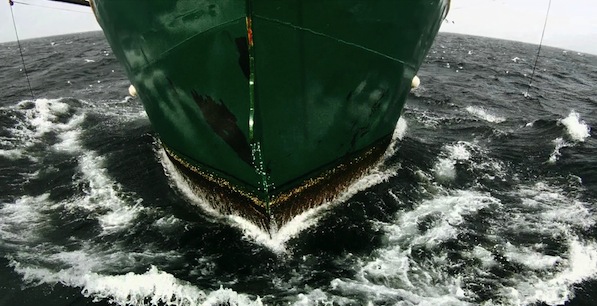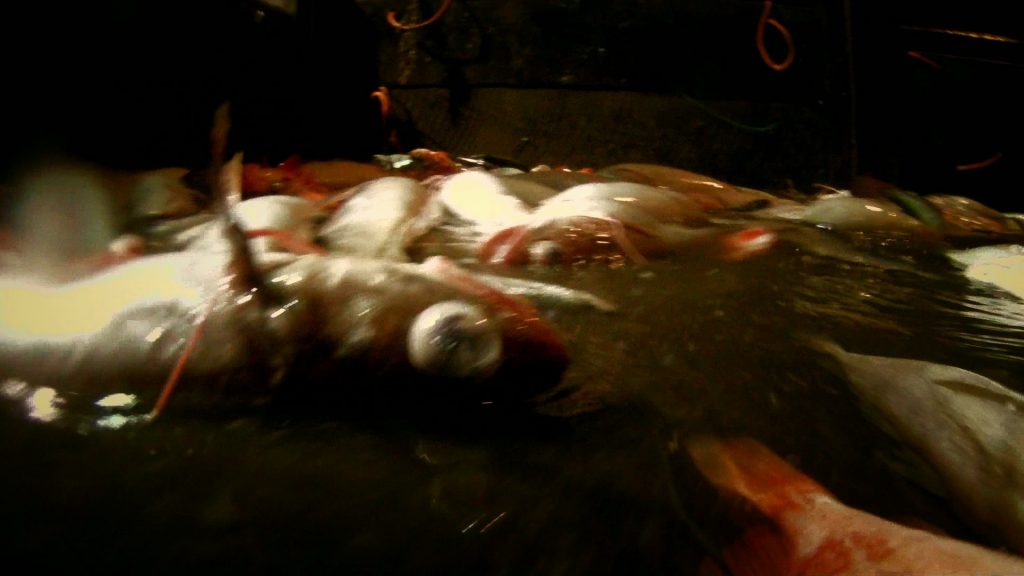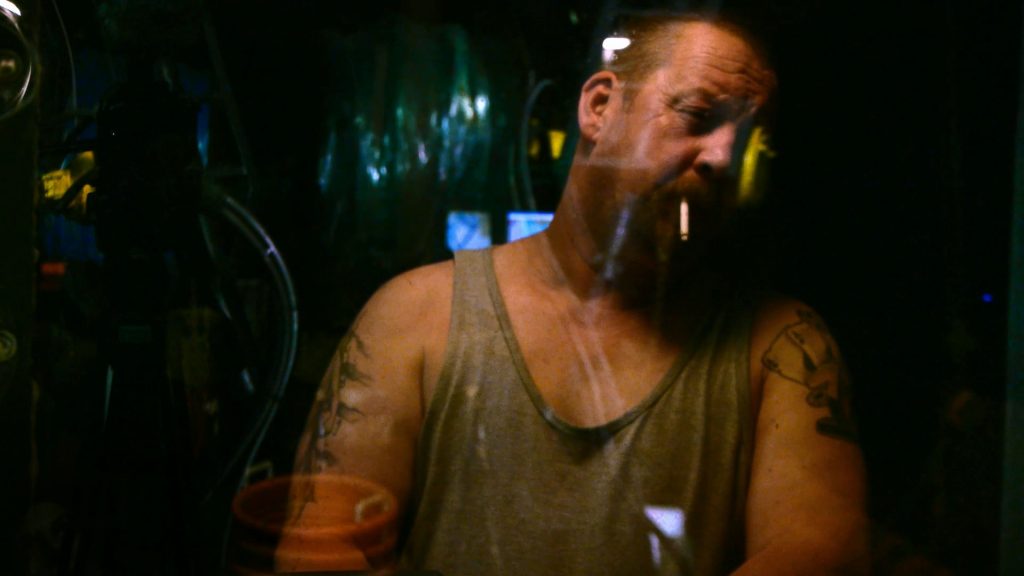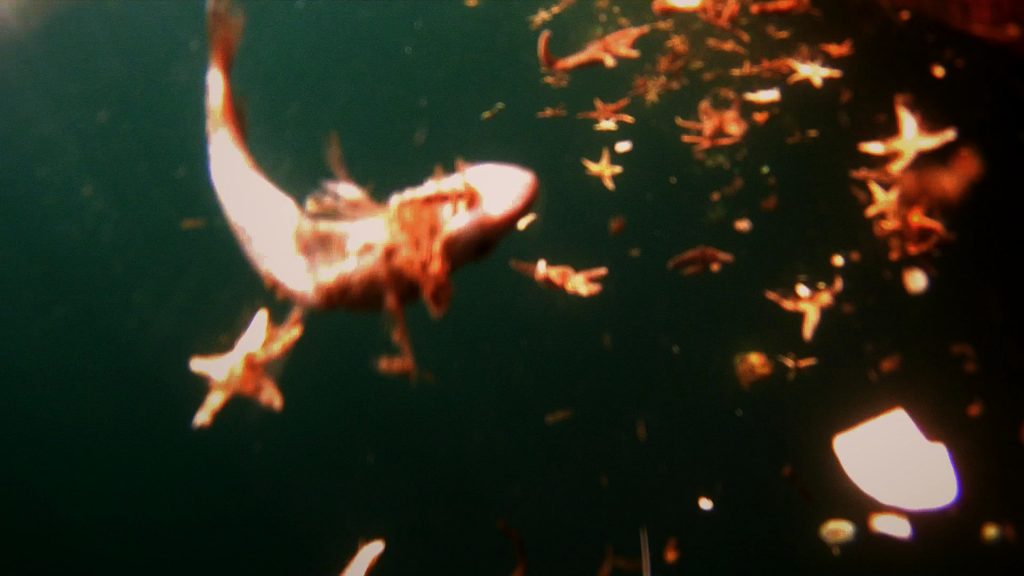When asked about their decision to film much of Leviathan using SLRs and GoPros, Lucien Castaing-Taylor and Véréna Paravel explained that they lost many of their larger cameras to the sea. One doesn’t doubt it after seeing the film, but this account elides their broader rejection of the traditional tools of the trade: not only tripods, but narration, exposition, the entire edifice of perspective. Embodiment is a first principle for much of the work produced out of Harvard’s Sensory Ethnography Lab (Castaing-Taylor is the SEL’s Director), but Leviathan goes considerably further in treating experience as a kind of reckoning. The film moves with the force of a great storm.
Castaing-Taylor and Paravel collected material off the coast of New Bedford, “the very waters where Melville’s Pequod gave chase to Moby Dick.” It doesn’t seem just to say that Leviathan documents industrial fishing when the subject is so manifestly overpowering. Perhaps better to say it derives from industrial fishing—or that it places itself in industrial fishing’s devouring path. We watch the men onboard doing repetitive labor; fish in their death throes; and the ship itself as an organism, ingesting fantastic loads of sea-life and depositing the bloody remainder back to the sea (we swim along thanks to those GoPros). While lacking interviews or voiceover, the danger of the environment—to body and soul—is utterly palpable.
Before anything else, we hear the clamor of metal and water. An image emerges in the boundless blackness of the sea. The ship’s deck is a slop of orange, green and more blacks; we glimpse a patch of blue dawn in the distance, but not where we expect. A taut chain drags out from the darkness—a kind of birth, perhaps. Inscrutable orders are barked out from the area behind the camera. The crisis of perception is visceral, nothing like the theoretical gambits one typically associates with critical ethnography. Of course it’s business as usual for the New England fishermen, who have spent the last several years battling for federal disaster relief. A retired Coast Guard officer stood up after a screening at the Ann Arbor Film Festival and applauded the film’s realism. I don’t think he wasn’t talking about the formal elements, but something deeper, something to do with extremes. “Cold dark deep and absolutely clear/element bearable to no mortal,” wrote Elizabeth Bishop in “At the Fishhouses,” another work invested in the sea’s sublime “indifference.”
Where documentaries like Planet Earth transform nature into spectacle by offering a smooth ride through otherwise inaccessible environments, Leviathan’s impossible shots make us acutely aware of the limits of human consciousness. Death is never far, from the discomfiting shot in which the camera is suffocated by a fresh load of fish to the more metaphysical detachment from the ship that culminates in the majestic final sequence in which the camera crashes the water’s surface in counterpoint to the gulls (how uncanny it is to see this age-old symbol of human freedom extricated from a human point of view). Suspended in this exploded record of nature and industry, a few motifs linger in mind: a man falling to sleep in the cabin; a single bird clamoring for scraps in the hold; the temporary repose of a ship trailing in the night; a man lingering before spearing another skate for butchering; and, crucially, a fleeting moment in which one of the men aboard lights two cigarettes in his mouth and then places one in the mouth of a coworker. We recognize this gesture from war movies: camaraderie in spite of everything.
Viewed from this angle, Leviathan seems a kind of cousin to embedded combat journalism. While operating with different principles and obligations than something like Restrepo (2010), a similar necessity is at stake: finding expression for a reality so severe that it defies representation. Not least of what make the whiteness of the whale appalling to Melville’s Ishmael is “the despair of putting it in a comprehensible form.” Both of Castaing-Taylor and Paravel’s previous films (Sweetgrass and Foreign Parts) widened the frame on visual anthropology, engaging long takes and an expansive use of sync sound to suggest the plenitude of meaning in the observable world. Leviathan tips the balance, admitting so much raw sensory data and of such a volatile nature that we seem on the verge of a complete collapse of meaning. One thinks of the painting hanging in Melville’s Spouter-Inn:
“On one side hung a very large oil-painting so thoroughly besmoked, and every way defaced, that in the unequal cross-lights by which you viewed it, it was only by diligent study and a series of systematic visits to it, and careful inquiry of neighbors, that you could any way arrive at an understanding of its purpose. Such unaccountable masses of shades and shadows, that at first you almost thought some ambitious young artist, in the time of the New England hags, had endeavored to delineate chaos bewitched.”
Ishmael finally discerns the “Leviathan itself” in the painting, but Melville pulls on the thread some more in a later chapter titled “Of the Monstrous Pictures of Whales”:
“…There is no earthly way of finding out precisely what the whale really looks like. The only mode in which you can derive even a tolerable idea of his living contour, is by going a whaling yourself; but by so doing, you run no small risk of being eternally stove and sunk by him.”
The very waters, indeed.







